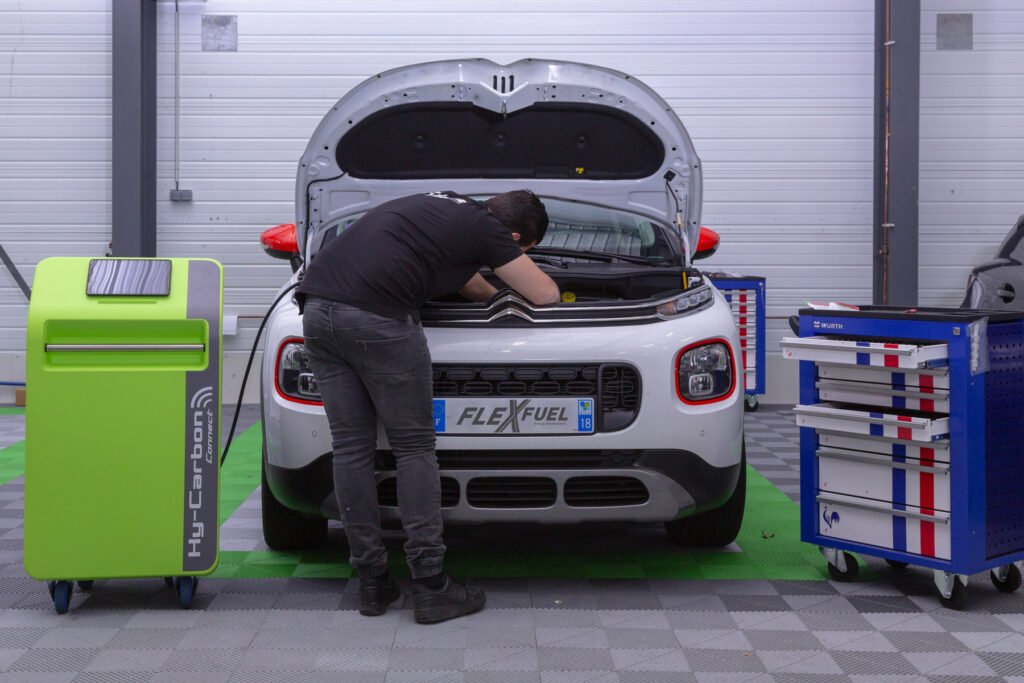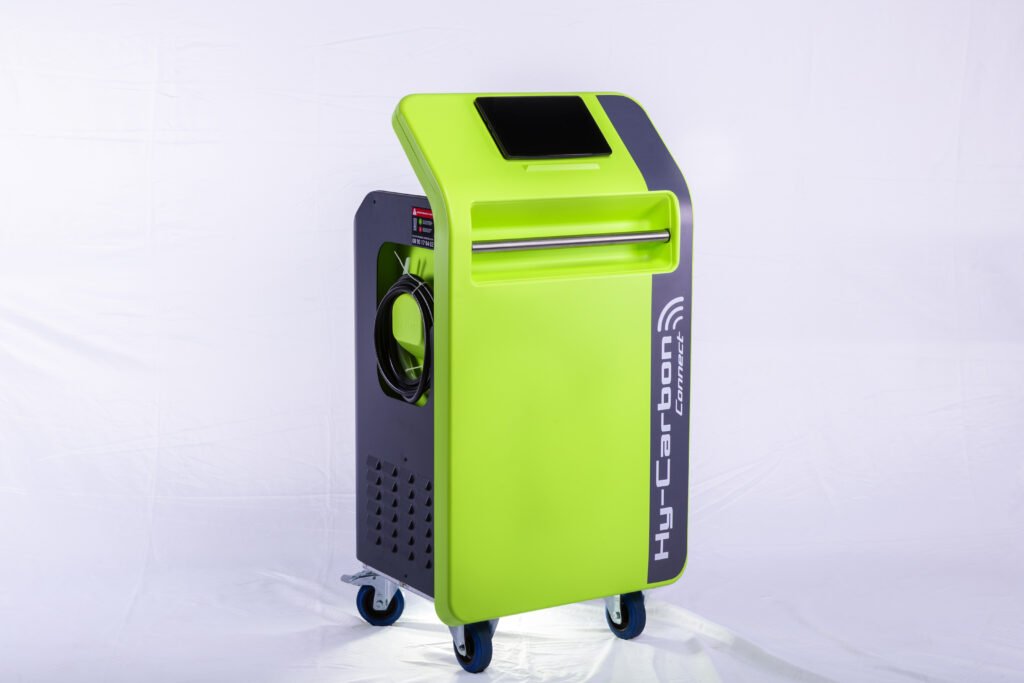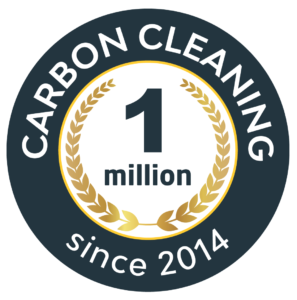Find out everything about engine cleaning
What is carbon cleaning?
Carbon cleaning is a process of removing soot, or carbon, from your engine. These deposits, made of unburnt hydrocarbons end up clogging your engine as well as other parts such as the EGR valve, Particulate Filter or even the turbocharger.

The FlexFuel solution: Carbon cleaning via hydrogen injection
Engine carbon cleaning by FlexFuel hydrogen injection is produced by improving a natural phenomenon of enriching the air-fuel mixture in your combustion engine. Our solution is efficient and non- aggressive, as it does not introduce any chemical or corrosive products into your engine. The carbon is simply dissolved inside the engine and naturally evacuated with the exhaust gases where it is collected by a special filter.
After the treatment, your vehicle will regain its original performance!
New! Carbon cleaning interface thanks to Hy-Carbon Connect

A technological innovation, Hy-Carbon Connect offers new functionality allowing a personalized and even more efficient service.
With three worldwide patents already registered, Hy-Carbon Connect, the result of four years of Research and Development, is a successful solution to the problems of clogged engines.
The Hy-Carbon Connect machine can diagnose the state of your engine and de-scale it using hydrogen injection. This innovation helps reduce the risk of breakdowns, reduces pollution and fuel consumption, creates your driver’s profile and monitors it.
But how exactly does Hy-Carbon Connect work?
The driver’s profile is first determined based on parameters such as annual mileage and driving environment. The Hy-Carbon Connect then independently analyses the clogging status of the engine’s sensitive parts, thanks to algorithms developed by FlexFuel®.
Following the diagnostic, Hy-Carbon Connect performs custom cleaning and sets specific parts in motion throughout the treatment, thereby restoring their original mobility.
After the cleaning, Hy-Carbon Connect produces a before & after report for the vehicle, which is sent to the driver.
Take advantage now from a unique and totally personalized service to bid farewell to problems related to your engine being clogged.
In summary, carbon cleaning by hydrogen injection is a solution which is:
- Robust: our technology was designed in 2008, initially for the industrial world and can withstand rigorous environments.
- Innovative: a dashboard allows Hy-Carbon to be controlled in a simple manner. The EGR Pilot option is an exclusive patented innovation which controls the EGR valve. Everything to guarantee you iron-clad efficiency!
- Economical: zero consumables, so no surprises in operating costs. Furthermore, the station being autonomous, the workforce is free to carry out other hands-on jobs.
Carbon cleaning is the solution that can reduce fuel consumption by up to 15%, reduce emissions by 50% and reduce the risk of a breakdown.
To carry on exploring the world of carbon cleaning and know everything about its aspects and advantages, we suggest that you view Why perform carbon cleaning on your car?”.
Why carbon clean your car?
There are advantages to carbon cleaning your car with our patented FlexFuel hydrogen injection machine. This will change the life of your vehicle, improve its performance, driving experience and save you money in the long run.
Regain your vehicle’s original performance
You will find a much healthier engine. The proof for this is those fault codes shown by the diagnostic that are corrected by carbon cleaning.
Say goodbye to hard starting engine, high fuel consumption, low engine performance, dashboard lights, black smoke and sluggish acceleration. Thanks to carbon cleaning, your vehicle will regain its original performance.
Eliminating engine soot restores lost horsepower in your car. Results: more agile driving and an engine that is more responsive in higher gears.
Carbon cleaning = restoring the performance of your vehicle!
Make it easier to pass your MOT Check
Say goodbye to failing your MOT Check on emissions! By regaining its original performance, your vehicle will emit 50% less CO2 at least!
With recent anti-pollution standards, especially measures on exhaust gas opacity, carbon cleaning your engine by hydrogen injection eliminates black smoke and makes passing the Roadworthiness Checks easier.
Whether diesel or petrol, unclogging your engine will emit fewer particulates.
Carbon cleaning = MOT Check passed!
Forget about expensive breakdowns
Almost three-quarters of the faults that occur with the engines are caused by carbon deposits.
New anti-pollution standards and speed restrictions increase carbon deposits in the engine and thus increase the possibility of the appearance of dashboard lights, or more seriously, of breakdowns.
By choosing carbon cleaning by hydrogen injection, you will avoid clogging and replacing expensive parts, such as the EGR valve (around £350), injection pump (around £1,000) or even the turbocharger (up to £2,000).
Carbon cleaning = no dashboard lights ON
Save money everyday by consuming less fuel
And the cherry on top is that your fuel consumption will reduce by up to 15%. With less trips to the petrol station, carbon cleaning your vehicle will save you more money on the long run.
Carbon cleaning = You save money every day!
Reduce pollution
By eliminating scale in all types of engines, you will reduce exhaust gas emissions. Maintenance of the vehicle also plays an important role in eco-driving, economic and ecological motoring, for the good of our planet and your bank balance. By regaining its original performance, your vehicle will emit 50% less CO2 at least!
Carbon cleaning = eco-driving
After carbon cleaning with FlexFuel Energy Development® hydrogen injection, the planet will say “Thanks!” Your bank balance and your vehicle too!
You will understand by now that unclogging your vehicle’s engine has technical, economic and ecological advantages.
The winning recipe: clean your engine at least once a year and you prolong your vehicle’s life.
How much does it cost?
Depollution of engines by hydrogen injection is a service performed by a garage equipped and trained by us.
Your garage equipped with a FlexFuel engine cleaning station by hydrogen injection will offer you the most suitable service for your vehicle.
What types of treatment are on offer from garages equipped with FlexFuel?
The type of treatment* will be defined by taking into account the various data from your vehicle amount of cylinders, mileage, your driving profile and there follows from those a clogging level for your vehicle.
Depending on the level of clogging of your engine, our partner garages trained and equipped with FlexFuel offer several hydrogen injection cleaning packages ranging from simple preventive to curative treatment with full cleaning.
Below is an overview of the two types of treatments *:
Preventive treatment:
Preventive treatment is advised in the context of maintaining your vehicle and prolonging the life of your engine. By preventing excessive clogging, you avoid breakdowns, over-consumption of fuel and loss of performance.
Curative treatment:
Curative treatments, on the other hand, allow treatment of breakdowns and malfunctions linked to the accumulation of carbon in your engine. This treatment also lowers fuel consumption and reduces your polluting emissions.
FlexFuel® de-scaling by hydrogen injection allows not only the unclogging of your engine, but also parts such as the Particulate Filter, turbocharger, EGR valve or even the injection system.
* The choice of one or the other of these services depends on your vehicle’s clogging level.
What are the applicable charges per treatment type?
The price of your carbon cleaning thus depends on the chosen type of treatment and parts needing to be cleaned, your vehicle’s engine type, but also the required treatment time for efficient unclogging.
According to the type of treatment, the maximum recommended retail prices range from £69 include all taxes and £299 include all taxes.
Recommended retail price for preventive treatment
- In the case of a 60-minute preventive treatment and for cylinders up to 2L, the recommended retail price is from £69 to £89.
- For cylinders of up to 4.5L, the preventive treatment is for 90 minutes, the recommended retail price ranging from £119 and £149.
- For higher capacity cylinders, a 120-minute treatment is applied at a cost of £249.
Recommended retail price for the curative treatment
- In the case of a 90-minute curative treatment and for cylinders up to 2L, the recommended retail price is from £89 to £109.
- In the case of a 120-minute curative treatment and for cylinders up to 4.5L, the recommended retail price is from £149 to £199.
- For higher capacity cylinders, a 120-minute treatment is applied at a recommended retail price of £299.
Do you think that is expensive? This cost is minimal compared to the expensive replacement parts that you will avoid…up to £3,400 in savings!
Is my car compatible?
All petrol or diesel vehicles are compatible with engine depollution treatment
Depollution of engines by FlexFuel Energy Development® hydrogen injection is compatible with all petrol and diesel engine vehicles.
A choice of treatments according to various parameters
Your garage will recommend a suitable service based on the state of the engine of your vehicle. These services will be determined according to your vehicle’s various parameters such as the amount of cylinders, mileage and driving profile.
Your FlexFuel® certified garage will establish the most suitable treatment for your vehicle.
A suitable treatment period to carbon cleaning your engine
Our partner garages, trained and equipped by FlexFuel, will recommend several flat rates for engine depollution by hydrogen injection, ranging from the simple preventive to the curative treatment with valeting.
According to the treatment, your vehicle will be out of use at your garage from 45 minutes to 2 hours.
For more information about costs, please consult our “How much does it cost?” section.
Where can I carbon cleaning my car?
You must have read about the benefits of engine depollution and the only things that remains now, is for you to find a certified, trained and equipped by FlexFuel garage nearby!
Congratulations, you have made the right choice to recover your vehicle engine’s health with total peace of mind!
On this page, you will find all the information required to prove to you in detail our quality process in the selection of certified partner garages.
FlexFuel Energy Development® now possesses a network of over 200 garages, trained in and equipped with hydrogen cleaning stations distributed throughout the UK and Northern Ireland. The scale of our network of FlexFuel certified partners allows you to benefit from our services wherever you are located in the UK.
What is a FlexFuel certified garage?
Our partners are selected with care for their diligence and their professionalism, in order to guarantee you suitable services and advice.
During installation of our FlexFuel carbon cleaning stations by hydrogen injection, our garages receive personalized training from our FlexFuel qualified and experienced technicians.
Furthermore, we continue to support our partners for the entire duration of the carbon cleaning station’s life. Our certified garages benefit from a remote technical After Sales Service open every day during normal working hours to answer their smallest query or request for technical details.
Accordingly, we require from our partners that they guarantee you a high-quality carbon cleaning service with the best conditions. Customer satisfaction is our motto and we thus strive to provide a quality service to our FlexFuel trained and equipped garages.
Our wish is for you to benefit from the ultra-efficient de-scaling treatment by hydrogen injection and with total peace of mind, therefore we do all we can to provide all support necessary to our partners.
Which services will be recommended to me at my FlexFuel equipped garage?
Once you have selected the FlexFuel equipped garage nearest to you, nothing is simpler, you just have to contact them to make an appointment!
Then, according to your vehicle’s various parameters – particularly the amount of cylinders, mileage, driver’s profile – your FlexFuel certified garage will define the type of treatment most suited to your vehicle.
Our partner garages, trained and equipped by FlexFuel, will recommend several flat rates for engine cleaning by hydrogen injection, ranging from the simple preventive to the curative treatment with full cleaning.
For more information on costs, please consult our tab “How much does it cost?”
What is the impact on my car?
Engine depollution treatment by hydrogen injection only has advantages:
- Unclogging your engine will allow it to recover its original performance.
- You will find a healthier engine, emitting a lot less fine particulates and eliminates black smoke. De-scaling by hydrogen injection will be a plus to passing your MOT Check!
- You will avoid the clogging and the replacement of expensive parts such as the EGR valve (around £300), the injection pump (around £1000) or the turbocharger (up to £2000
- It will reduce your fuel consumption by up to 15%.
You will understand by now that unclogging your engine with the de-scaling system with hydrogen injection is the perfect ally for your vehicle’s long life!
So what are you waiting for, book an appointment with a FlexFuel affiliated garage, equipped with a hydrogen injection de-scaling station.
What warranties do we offer?
Certified garages by FlexFuel are equipped with de-scaling stations by hydrogen injection. Entirely manufactured in France, our stations are the result of many years of Research & Development.
We offer you a sophisticated solution for engine depollution that is efficient, non-aggressive and ecological, in order best to respond to the problems posed by carbon deposits in engines.
The efficiency of our solution: our figures speak for themselves.
With over 1 million de-scaling services carried out since 2014 and no accidents arising from the service have been declared!

Our FlexFuel solution guarantees the efficient and gentle cleaning of your vehicle.
Our FlexFuel solution is efficient and non-aggressive, as it does not introduce any chemical or corrosive products into your engine. The soot is very simply dissolved in the engine, thanks to the hydrogen injection and is expelled naturally with the exhaust gases, where it is collected in a special filter.
The cleaning of your engine therefore occurs gently and the treatment carried out by your FlexFuel certified garage will be adapted to your vehicle’s level of clogging.
FlexFuel de-scaling by hydrogen injection is the zero risk solution for unclogging your engine.
Cleaning an engine is always beneficial and necessary to ensure its longevity.
Depollution of your engine with the FlexFuel Energy Development® solution is a gentle treatment, which only ever targets scale and under no circumstances damages your engine.
For enthusiasts
Catalytic converter: Function and maintenance
Lambda sensor: Function and maintenance
Everything about OBD diagnostics
Spark plugs: Function and maintenance
Diesel particle filter: Function and cleaning
EGR valve: Function and maintenance
Turbocharger: Function and maintenance
Fuel injector: Function and maintenance